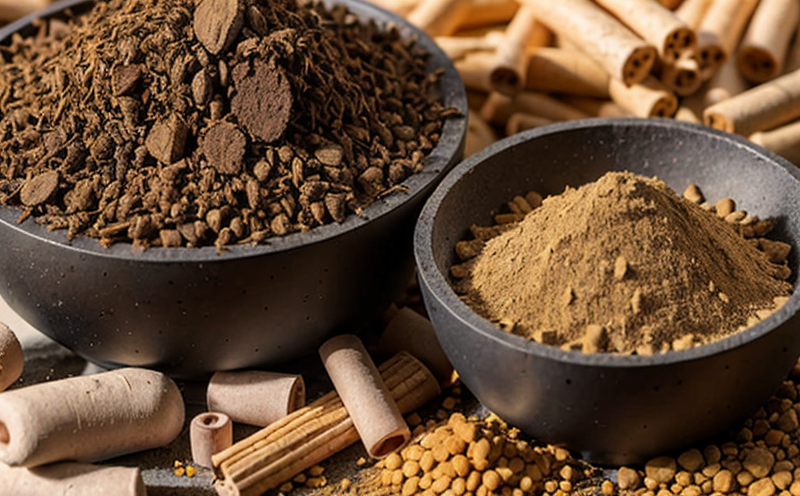ISO 17225 Classification of Solid Biofuels Testing
The ISO 17225 classification is a critical component in the quality assurance and regulatory compliance framework for solid biofuel products. This standard provides a structured methodology to classify solid biofuels based on their chemical, physical, and energy properties. For industries that rely heavily on renewable energy sources, ensuring product consistency and performance is paramount. By adhering to ISO 17225 standards, manufacturers can guarantee that their biofuels meet the highest quality benchmarks.
The testing process involves a series of meticulous procedures designed to evaluate various parameters such as moisture content, ash content, volatile matter, fixed carbon, and calorific value. These tests are essential for identifying the type of biomass being used in the production of solid biofuels. The classification helps determine which biofuel is best suited for specific applications, whether it be for power generation or heating.
At Eurolab, our team of experts uses state-of-the-art instrumentation and adheres strictly to ISO 17225 guidelines. Our laboratory offers a comprehensive suite of services that cater to the diverse needs of energy companies, research institutions, and government bodies. From initial sample preparation to final analysis, we ensure that every step in the testing process is conducted with precision and accuracy.
The importance of this classification cannot be overstated. It plays a crucial role in optimizing fuel performance, reducing operational costs, and meeting stringent environmental regulations. By providing accurate and reliable test results, Eurolab supports its clients in making informed decisions that contribute to the sustainable development of their bioenergy projects.
The first step in the testing process is sample collection and preparation. Properly preparing the samples ensures consistency and accuracy in subsequent tests. Once prepared, the samples undergo a series of analyses aimed at determining their chemical composition and physical properties. The data collected from these tests forms the basis for classifying the biofuels according to ISO 17225 standards.
The second section involves calorific value determination using bomb calorimetry. This method measures the heat released when a specified amount of fuel is burned under controlled conditions. Calorific value is one of the key parameters used in classifying solid biofuels because it indicates the energy content per unit mass or volume, which directly impacts the performance of the fuel.
Another critical parameter tested is moisture content. Excess moisture can significantly reduce the efficiency and effectiveness of a biofuel by increasing transportation costs and decreasing its heating value. Therefore, accurate measurement of moisture content is essential for ensuring that biofuels meet the specified standards set forth in ISO 17225.
Ash content analysis provides insights into the mineral components present in the biomass. High ash content can lead to issues such as erosion and fouling within combustion systems, thus affecting both performance and longevity. Understanding the ash content allows for better optimization of fuel usage and maintenance planning.
Applied Standards
| Standard | Description |
|---|---|
| ISO 17225:2016 | Classification of solid biofuels based on chemical and physical properties. |
| ASTM D5865-18 | Determination of ash content in biomass materials. |
The testing methods employed are meticulously aligned with internationally recognized standards like ISO 17225 and ASTM D5865. These standards provide clear guidelines on the procedures to be followed, ensuring that our results are both accurate and reproducible.
Eurolab Advantages
At Eurolab, we pride ourselves on offering unparalleled expertise in energy sector testing. Our team of highly qualified professionals is dedicated to delivering precise and reliable test results that meet the stringent requirements set by ISO 17225 standards.
We have invested heavily in cutting-edge technology and infrastructure to ensure that our laboratory remains at the forefront of analytical capabilities. This commitment allows us to provide comprehensive testing services that are tailored to the unique needs of each client.
Our advanced equipment, combined with years of experience, enables us to analyze a wide range of biofuel samples from various sources and types of biomass. Whether it's agricultural residues, wood chips, or other organic materials, we have the capability to classify them accurately according to ISO 17225 guidelines.
In addition to our technical prowess, Eurolab is recognized for its commitment to sustainability and innovation. We work closely with clients to understand their specific challenges and develop tailored solutions that not only meet current standards but also anticipate future trends in the energy sector.
International Acceptance and Recognition
The ISO 17225 classification is widely accepted across numerous countries, including those committed to reducing greenhouse gas emissions and promoting sustainable energy practices. Many governments have incorporated this standard into their national regulations, thereby ensuring that biofuels used within their borders comply with international best practices.
By adhering to ISO 17225 standards, companies can gain a competitive edge in the global market. The classification not only enhances product quality but also facilitates smoother trade between countries by standardizing measurement and evaluation methods.
The widespread adoption of this standard underscores its importance in the realm of renewable energy testing. As more nations embrace bioenergy as part of their renewable portfolio, compliance with ISO 17225 becomes increasingly crucial for maintaining market access and operational efficiency.





